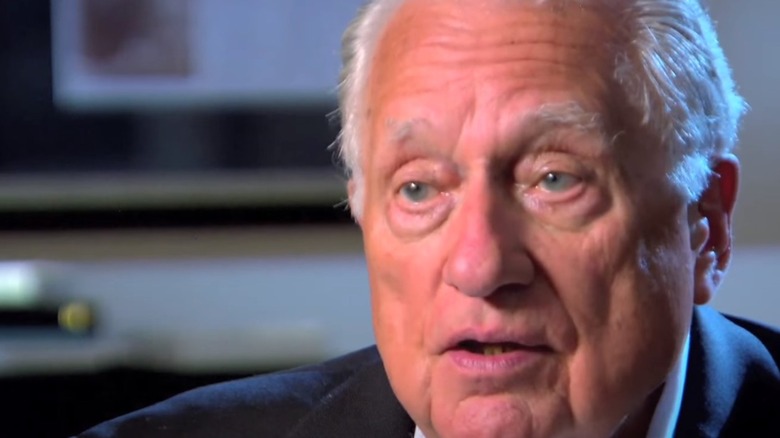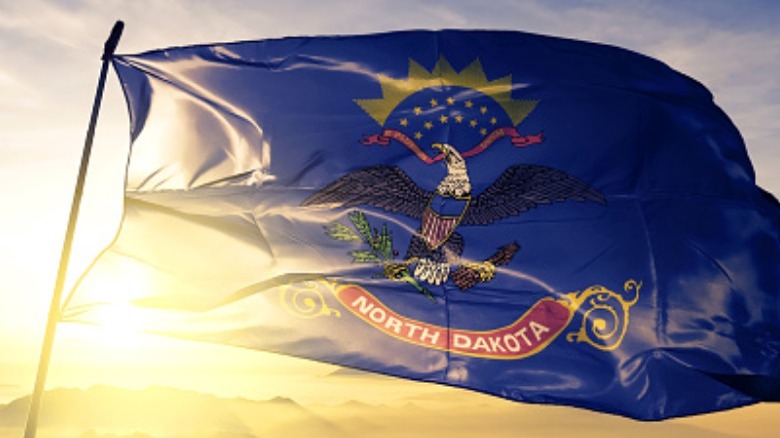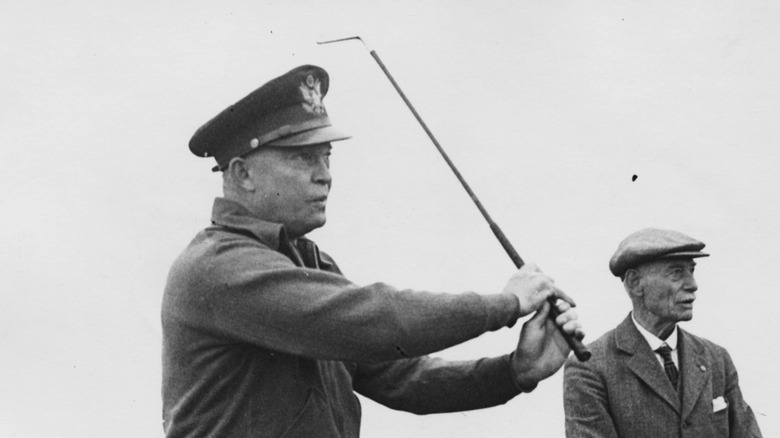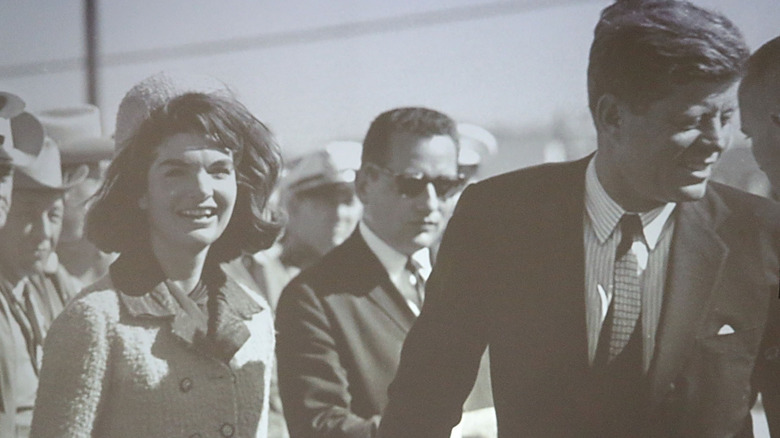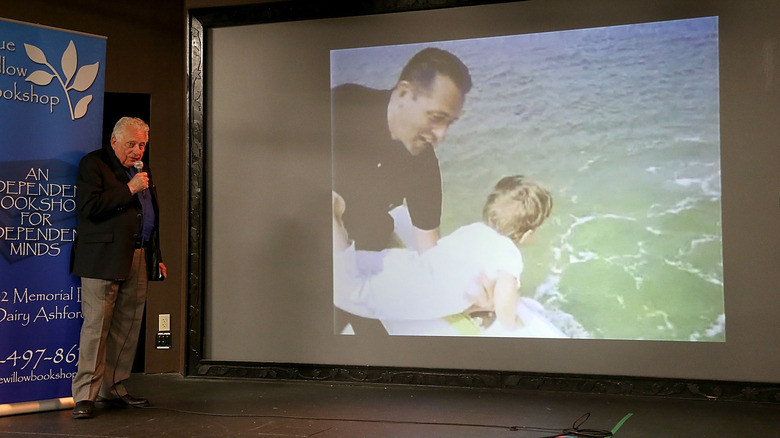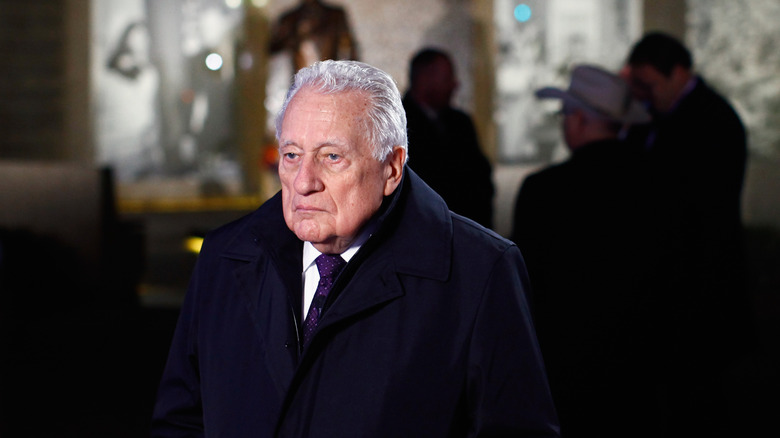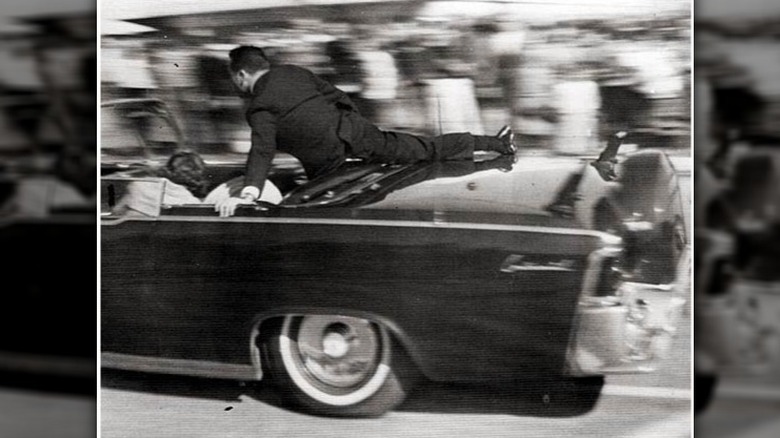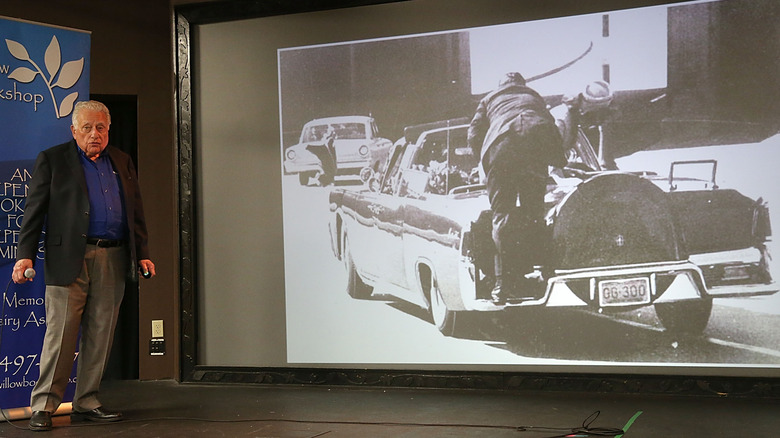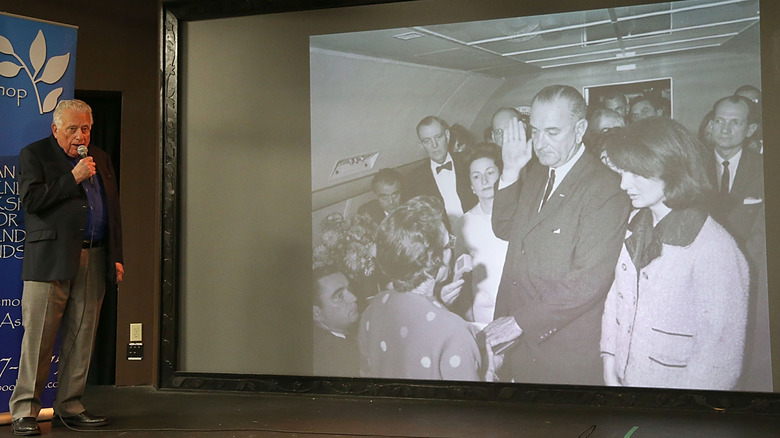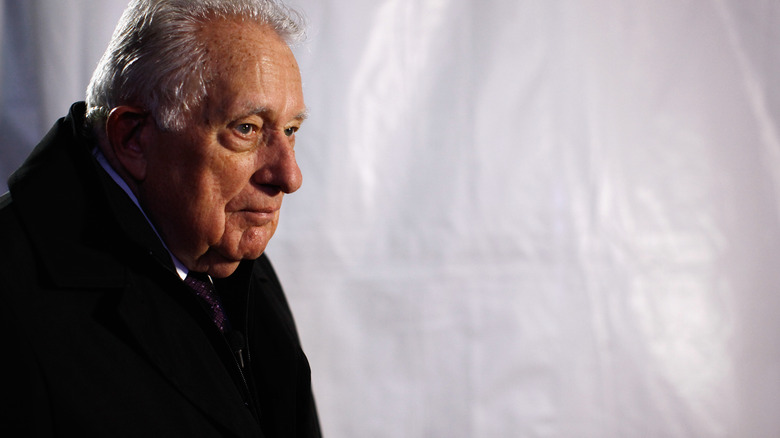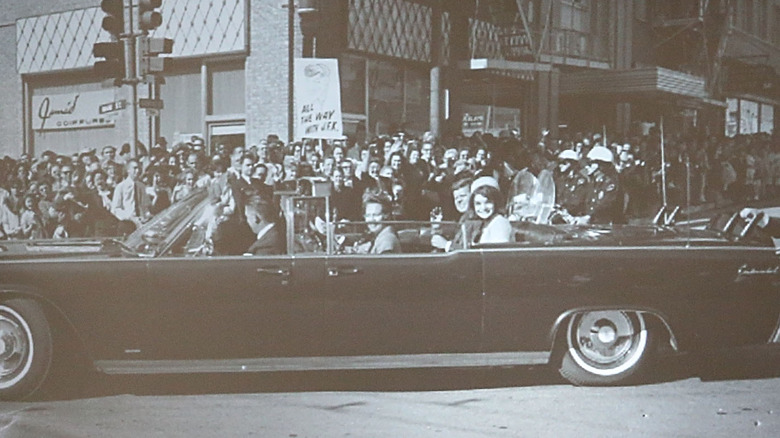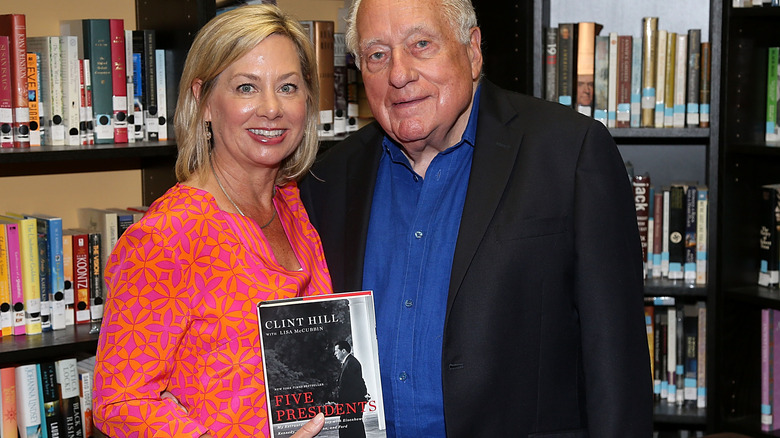Clint Hill: The True Story Of The Man Who Tried To Save JFK
Clint Hill might not be a household name, but images of him are an iconic part of American history. He was front and center on the day when the nation changed forever: He was the Secret Service agent who jumped on the back of President John F. Kennedy's limo in the seconds after he was shot. He can be seen pushing first lady Jackie Kennedy back into the car and shielding them both as the car sped away. In 2017, he summed up his feelings to The New York Times: "I wish I had been quicker."
It was, of course, November 22, 1963. When Vanity Fair took a second-by-second look at the assassination, they noted that the first bullet caught JFK in the throat. It's possible that might not have been deadly, but the shot that was fired five seconds later absolutely was. Reviews of the incident revealed that at that moment, Hill and fellow Secret Service Agent George Hickey were the only two of Kennedy's detail to react with the split-second reflexes they were expected to.
Still, it wasn't enough: By the time Hill got there, JFK had already suffered a fatal gunshot wound. Understandably, Hill didn't speak much about that day outside of his official duties, until he partnered with author Lisa McCubbin to write what would become four books on his career (per Simon & Schuster), not only as a Secret Service agent there that day in Dallas, but one who served under five presidents. His life has been a fascinating one.
His original career plan was far from the Secret Service
Clint Hill had no designs to be a part of history, or even a part of the Secret Service. Born in North Dakota in 1932, his mother turned him over to the North Dakota Children's Home, where he was adopted by a couple and raised with their other adopted child.
After high school, he worked in construction, surveying, and on a family farm. He went to college fully intent on becoming a history teacher and a coach, but that's where fate intervened. According to the North Dakota Office of the Governor, Hill was trained in counterintelligence during his mandatory three years of military service, and he told the John F. Kennedy Presidential Library and Museum that when he was introduced to Denver Secret Service agents at the end of his military service, he decided that it was an opportunity he couldn't pass up.
Of course, not all Secret Service agents end up protecting presidents, and Hill said that everyone had a 30-day posting at the White House. There, they chose the best of the best to become a part of the Presidential team, and on November 1, 1959, Hill was appointed to the security detail of President Dwight D. Eisenhower. Instead of teaching history, he got to experience it in the making.
Protecting President Dwight D. Eisenhower
Secret Service agents are easy to overlook, but where the president goes, they go. Clint Hill served under five presidents, and that means he had a front-row seat to not only the assassination of JFK, but the big and small moments that shaped the country.
He described his time alongside President Dwight D. Eisenhower to the John F. Kennedy Presidential Library and Museum, saying that Eisenhower's military training never left him. He was on time to a matter of seconds, and Hill recalled, "We, the agents, were more or less like his troops. He didn't know our names. ... [We] were just, 'Hey agent!' ... ." That was in complete contrast to JFK, as Hill told The San Diego Union-Tribune: "He knew all of the agents by name, he called all of them by their first name, took time to talk to each and every one of them. He knew if they were married, if they were single, if they had children. That was something special."
Hill's front-row seat to presidential history means that he can tell some great stories. When Today asked him about golfing with Eisenhower, he said the agents had inside jokes about how good or bad he would do. The bane of Eisenhower's golf game? A tree in the middle of a Georgia golf course that he would hit every time he played there. His attempts at getting the tree removed failed, and it's still known as The Eisenhower Tree.
After not wanting the Kennedy assignment, he came to cherish it
As Vanity Fair notes, Clint Hill (center) was a part of Jackie Kennedy's security detail. He always had been — and when he spoke with the John F. Kennedy Presidential Library and Museum, he was pretty straightforward about the fact that he didn't want the job. "I was really disgusted," he said about the moment he found out who he was going to be protecting. "... I had seen what former first ladies did. Fashion shows, tea parties, ballet school. I didn't want any part of that. But, I had to accept it."
That changed, though, and Hill recalled the moment that Jackie Kennedy became not just the first lady, but a friend. They were driving around Washington, DC — Hill and the driver in front, Kennedy in the back — when Hill lit a cigarette. Kennedy gave the order to pull the car over ... to ask if he'd ride in the back with her so she could bum a cigarette and have someone to talk to.
Decades later, Hill rediscovered a steamer trunk filled with memorabilia from the nearly four years he'd spent traveling the world with her, from Venezuela and Paris to India and Morocco — where, he shared, they sampled some traditional desserts at the behest of King Hassan, only realizing later that they were basically pot brownies. The trunk inspired the book "My Travels with Mrs. Kennedy," and People says Hill explained, "We had a bond, a bond that was really almost indescribable."
He was there for Kennedy family milestones
Clint Hill wasn't just there for the public and official events, he was there for the family moments, too. He told the John F. Kennedy Presidential Library and Museum that Jackie Kennedy was about eight months pregnant when she went into labor early with John, Jr., and it was chaos: JFK had just gotten on a private plane to Palm Beach, she was rushed to Georgetown Hospital, and no one could get in touch with anyone. The soon-to-be-first lady (as JFK had been elected but not yet sworn in) underwent an emergency C-section, and it wasn't her husband at her side, it was Hill.
Ironically, he added that he wasn't at the inauguration: He was on security detail for the Kennedy children, Caroline and John, Jr. He had specific instructions, too: "The agents were to treat them as if they were just one of their own. If the kids fell down, they got up. You didn't help them. They had to learn all this stuff on their own."
Hill has written not just about the fond memories, but the not-so-fond ones as well — and there were a lot. In 1963, their whirlwind of activities came to a temporary halt as she prepared for the arrival of another baby. Patrick Bouvier Kennedy died when he was just two days old, and Hill wrote (via The New York Times): "Mrs. Kennedy was devastated. I felt as if my own son had died, and we grieved together."
Presidential security was very, very different
At the time of John F. Kennedy's assassination, presidential security was incredibly different. Hill spoke with U.S. News & World Report on the differences, saying: "I was sworn in. I was presented with my credentials, a gun, a badge, my handcuffs. I was taken to the range, qualified, and that night I was on a protective detail. That wouldn't happen today."
Not only did JFK's agents have no formal tactical training or even basic first aid, but there was another major thing that changed after the assassination: Hospitals are prepared with trauma physicians on-site when the president is in town. Communications, too, have come a long way, and Hill said that when Kennedy was killed, their protocol for signaling a fatal wound was to give other agents a thumbs-down. And there weren't many agents at all — just 269 in the entire agency, all to keep the president safe in his convertible, as he followed a motorcade route that had been printed and distributed in papers days in advance.
The assassination signaled a massive overhaul for the agency, which saw numbers and budget increases. (Another massive increase in both came after the 1981 attempt on President Ronald Reagan's life.) But that said, Hill had something that can't necessarily be trained: As he told The Sun, "At the time [of the assassination], I never thought 'I might be killed,' or 'I don't see my kids again.' I didn't think that at all. That was the farthest thing from my mind."
He remembered every moment of the assassination with crystal clarity
Clint Hill was 82 years old when he spoke with CBS News in 2013, and even though decades had passed, the events of the November day in Dallas, 1963, were still crystal clear. Jackie Kennedy, he recalled (via The New York Times), was still reeling from the loss of her infant son, and the trip was meant to sort of ease her back into public appearances. The Dallas motorcade was meant to be like the others they'd done, until suddenly, it wasn't.
Hill reacted to the first shot, and ran for the president's car. He wrote: "I was just feet away when I heard and felt the effects of a third shot. It hit the president in the upper right rear of his head, and blood was everywhere. Once in the back seat, I threw myself on top of the president and first lady so that if another shot came, it would hit me instead."
Hill stayed in the car as they rushed to the hospital, and once they were there, Jackie Kennedy refused to let go of her husband ... until Hill took off his jacket and used it to cover the president's wounds. He fielded a phone call from Robert Kennedy, and then he was tasked with finding a casket. He was one of the men who carried it onto Air Force One, which was where Jackie ran up to him ... and asked him if he was all right. He stayed at her side for the days following the assassination.
He doesn't believe there was a conspiracy
The last moments of JFK have been played over and over, and there have always been theories surrounding the circumstances of the assassination. For Clint Hill, there has never been anything to debate: As Marin Magazine recounts, he wasn't just there, he was the one who — from the back of the bloodied limo — turned to the other Secret Service agents and gave the signal that whatever happened, it was over and the fatal consequences were done: It was a thumbs-down gesture that was unmistakable.
It took Hill decades before he would talk about the assassination, and it wasn't until 2009 that a phone call from author Lisa McCubbin convinced him to talk about what had happened that day. And for him, it was clear. When asked if he believed Lee Harvey Oswald was the lone gunman, he replied: "I do. He was an individual who, over the preceding years, had desperately sought attention. ... Lee Harvey Oswald, acting alone, killed President Kennedy. Based on all the information I've been exposed to, including the Warren Commission, that's the conclusion I have reached."
He's repeated that over and over again, including to TMZ in 2017 (via The New York Times).
He's spoken about the PTSD he suffered from after JFK's assassination
Clint Hill called it "a Secret Service Agent's Burden," and wrote (via his website) that for years, it had never occurred to him that he was struggling with what would now be diagnosed as PTSD. It took decades for him to not only come to terms with the lasting impact the assassination had on him, but to realize that there were therapies out there to help people cope.
After the assassination, Hill found himself struggling with feelings that he had failed. "We had a responsibility to keep the president from being assassinated, and we were not able to do that," Hill told News On 6. "And it just started to really eat at me. I was really drinking myself to death, and I just lived on ... cigarettes and alcohol." He recounted just how bad it got in his books, saying (via People) that the guilt had consumed him, and he was in Palm Beach one night when he simply walked out into the ocean and kept walking. "I wanted the water to swallow me up," he wrote, and was ultimately dragged out of the water by local police.
Since then, Hill's mission has become twofold: In addition to speaking about what really happened during the assassination and what went on behind the scenes with the Kennedys, he also does outreach to encourage others with PTSD to find the help that is available.
If you or someone you know needs help with mental health, please contact the Crisis Text Line by texting HOME to 741741, call the National Alliance on Mental Illness helpline at 1-800-950-NAMI (6264), or visit the National Institute of Mental Health website.
He went on to protect three more presidents
Friendships come and go, and as close as Clint Hill and Jackie Kennedy became in the years he spent as her dedicated Secret Service agent, they drifted apart. Hill talked to Marin Magazine about the last time they spoke, and was at the marking of another Kennedy family tragedy: Robert Kennedy's funeral. That was five years after JFK had been killed, and Hill said that they spoke briefly and went their separate ways.
Hill went on to work for three more presidents: Lyndon B. Johnson, Richard Nixon, and Gerald Ford. He sat down with Today around the release of his book "Five Presidents," and has shared some of the stories that happened behind the scenes. The stories put some of the most powerful men in perspective: LBJ donning a trench coat over his PJs, and informing Hill that he's going out to do some Christmas shopping, and along with the loneliness and introversion of Richard Nixon, a hilarious Elvis story.
Elvis, he recalled (via People), showed up at the White House wanting to see Nixon to ask if the president wanted his help getting the country's youth to turn away from drugs. Elvis gifted Nixon a gun, and Nixon gave him an honorary badge declaring him a Federal Bureau of Narcotics and Dangerous Drugs Agent. "[Elvis] believed he had some authority, which he did not have," Hill recalled. "[But] he went away happy."
A forced retirement ... and return to Dallas
Clint Hill retired not long after Gerald Ford was sworn in as president, but according to what he told Marin Magazine, it wasn't a voluntary retirement. Just 43 years old, he could no longer pass the physical requirements of Secret Service agents: "I knew I was having... gastrointestinal problems, neurological problems; I didn't think I was having psychiatric problems. But I was told my emotional problems over what had happened on November 22, 1963, and a few days after were causing all these other problems."
And so, he retired. And, with nothing to do, he soon withdrew. Hill recalled that at the time, there was no support system put in place for present or former agents, and he essentially took his alcohol and cigarettes, withdrew from friends and family, and spent years rarely even leaving the basement of his home (via The New York Times). By 1982, a friend — who was also a doctor — got through to him, and told him that he was very slowly killing himself.
He gave up the smoking and drinking, but it wasn't until 1990 that he could bring himself to overcome a massive hurdle: Returning to Dallas. He told Today that he walked through Dealey Plaza, and walked up to the sixth floor of the Book Depository. It was cathartic, and he explained, "I came away realizing that I had done everything I could on that day."
If you or anyone you know needs help with addiction issues, help is available. Visit the Substance Abuse and Mental Health Services Administration website or contact SAMHSA's National Helpline at 1-800-662-HELP (4357).
His life was incredible, but came at a cost
It's easy to look at a life like Clint Hill's and think that surely, he had to have realized that he was living the dream of every person who grew up watching James Bond. But Hill told Marin Magazine that he had never really realized just how many places he'd been, or the exciting life he'd lived, until he started writing about it.
At the same time, though, he's very realistic about what that life cost him. "I had two boys and they grew up without me," he recalled. "Their mother raised them. I was gone 80 to 90 percent of the time. I wasn't there for my sons' births or their birthdays. Christmas, gone. Easter, gone. My life was strictly the Secret Service." As a trade-off, he was there for the Kennedys: In an interview with the John F. Kennedy Library and Museum, he shared how Jackie Kennedy had asked the agents waiting with John Jr. before the funeral to teach him how to salute. They tried, but he would only salute left-handed ... until a Marine colonel came in and — within five minutes — had him prepped to salute his father as he was laid to rest.
He recalled, too, the night after the public funeral, he escorted Jackie Kennedy back to the cemetery for her private goodbye. When Today asked him if he would live the same life again, he responded, "I'd go right back there tomorrow morning."
